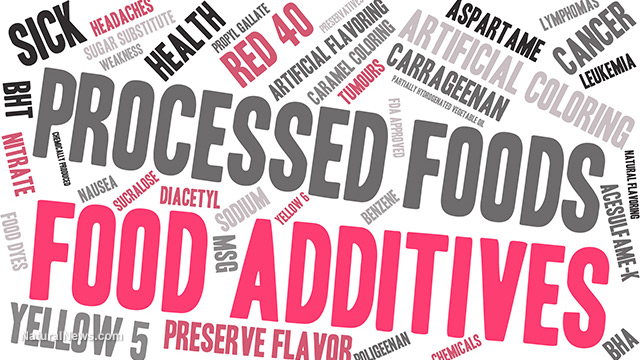
Advertisement
Experts have warned that almost half of prepackaged foods sold in Europe have too much sugar, salt or fat. An October 2019 study looked at almost 3,000 products found on supermarket shelves in 20 European Union countries. Breakfast cereals, yogurts, ready meals and processed meats and seafood were among the products the study authors scrutinized. Based on EU nutrition guidelines, they found that 48 percent were too unhealthy to be marketed to children.
Previous research has shown that marketing foods with high amounts of fats, sugar and salt are detrimental to children’s diets.
Scientists at the European Commission’s Joint Research Centre carried out the study. They analyzed the nutritional breakdown of 2,691 foods from 20 EU member countries. The products came from supermarkets in Germany, Holland, France, Spain, Italy, and the U.K. back when it was still a part of the EU. Afterward, researchers then cross-referenced these nutritional facts with the EU Pledge and World Health Organization (WHO) Europe marketing criteria.
Based on the study findings, 48 percent of the examined products – amounting to 1,281 – were ineligible to be marketed to children under EU Pledge criteria. Furthermore, 68 percent of the products examined – 1,821 items – were ineligible under the slightly stringent WHO Europe criteria.
The EU Pledge is a voluntary initiative by leading European food and beverage firms regarding advertising to children below 12 years old. Member companies who pledge cannot advertise foods and beverages to children under 12 on television, print or online. Products fulfilling common nutritional criteria are exempt from this ban. Companies who pledge are also not allowed to promote their products in primary schools. However, they are allowed to communicate their products for educational purposes only upon school administrators’ request.
Meanwhile, the WHO Europe criteria aim to “improve food system governance and overall quality of the population’s diet and nutrition – to ultimately promote health and well-being.” Among the priority actions for the criteria include restrictions on marketing food and non-alcoholic products and reformulation of food products for better nutrition. The WHO action plan also calls for a “trans-fat free Europe” by banning or eliminating trans fats from the food Europeans eat.
What food products were the biggest offenders?
The study named multiple food items as the biggest offenders: cereals, yogurts, processed foods and ready meals.
The team found that 37 percent of breakfast cereals they looked at, which was about 267, failed to meet EU criteria. These cereals contained too much sugar, yet lacked enough fiber. “Given the popularity of breakfast cereals, this may be viewed as a missed opportunity for increasing consumers’ fiber intake, which regularly falls short of intake recommendations,” the study authors noted.
It continued that breakfast cereals are not fit to be marketed for children under the WHO Europe model due to their excessive sugar content across different countries.
Yogurts were also among the products named, with several failing to meet total and saturated fat criteria. Twenty-nine percent of yogurts scrutinized – amounting to 196 products – were named as unhealthy due to their excessive sugar and fat content.
Many frozen meals exceeded the EU’s calorie and salt threshold, with 64 percent or 329 ready-to-eat products being branded as too unhealthy. Processed foods also registered excessive levels of salt – following scrutiny of 64 percent of processed meats and 59 percent of processed seafood.
The researchers did not mention brands they looked at for its study but said that these were among the best-selling products in Europe. “Given the considerable market share of many products, there are likely to be consumed widely – and in some cases regularly, including by children, even without being marketed to them.”
In response, the EU and the WHO set up thresholds to prevent children from being victimized by junk food manufacturers. But it is unclear how leading products sold in Europe would stack up.
What are the next steps after the EU researchers’ findings?
The researchers wrote that their study “shows the need and scope for food product reformulation and innovation.” According to them, food product reformulation serves as a “primary lever” to adjust the amount of beneficial nutrients and minimize harmful ingredients in food products being sold. This, in turn, leads to people getting more of these important nutrients with every bite.
However, they noted that “meaningful compositional changes are achieved” and that the reformulated products “make a substantial contribution to people’s diets” if reformulation ought to impact public health. The researchers continued: “In this regard, nutrient profile models can be useful benchmarking tools to monitor and evaluate food reformulation efforts.”
While the study cannot provide insight into consumed servings or nutrients obtained from these sources, the findings could be useful for monitoring and improving food supply. The study authors noted that regular analysis is key to determining if food products have improved over time. Routine analysis will also check if producers are fulfilling their commitments to reduce salt, saturated fat and added sugars.
The researchers proposed that the recently revised EU Pledge nutrition criteria, with its less stringent nutrient criteria, could provide short- to mid-term targets. Meanwhile, the stricter WHO Europe model can serve as long-term targets to reach.
Visit CleanFoodWatch.com to find out more about harmful sugar, salt and fat from the food we buy and eat.
Sources:
Advertisements







